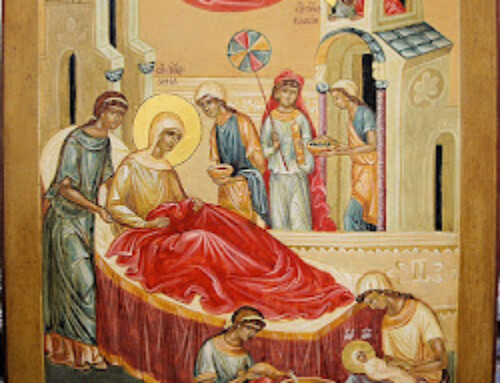Word Magazine June 2001 Page 29
THE TRUE MEANING OF FEASTS
By Very Rev. Stephen Rogers
Pascha . . . Pentecost . . . the Transfiguration . . . the Exaltation of the Cross . . . the Nativity … Each year as the seasons change and the months roll by, the faithful of the Orthodox Church are called to celebrate a procession of feast days which commemorate important truths concerning our Lord and our faith in Him. Some people see feasts as much-anticipated celebrations; others see them as dreaded obligations. Whether we anticipate the feasts with joy or dread or indifference, there is a tendency to see them as events. We are celebrating an event which took place in the past, an historical event which marks an important moment in the history of our faith.
Even if we look toward the feast with joy and anticipation, if we are simply looking forward to an event, we are missing the point. For in celebrating the feasts of the Church merely as historical events, important as they may be, we are losing sight of the deeper truth and richer blessings God intends the feasts to bestow.
Saint Maximos the Confessor (662 AD) understood the true reason for days and seasons in the Church:
“God ordained the honoring of the Sabbath, the months and festivals, not because He wanted these days to be honored by men as days, for that would be serving the creature more than the Creator (Rom. 1:25), implying that days are naturally worthy of honor and therefore of worship themselves. But through the ordinance to honor the days, He symbolically ordained the honoring of Himself. For He, Himself, is the Sabbath, the source of rest from the cares and labors of life. He is the Pascha, the Liberator of those held in the bitter servitude of sin; He is the Pentecost, the beginning and end of all.”
St. Maximos the Confessor proclaims what we must never lose sight of. The celebration of feast days is not about events, it is about a Person. It is not the recognition of a truth, it is the honoring of the Incarnate Truth. The feasts are not merely a means to know about Christ; they are a means to know Christ himself.
In the Gospel of John, Christ makes this proclamation to His apostles: “I am the way, and the truth and the life” (John 14:6). Truth is not a body of knowledge. Truth is not the accumulation of facts. Truth is a Person. To know the truth is to know Christ.
Ultimately, everything we do in the Church has as its end knowing Christ. We are not seeking information; we are seeking a relationship. In celebrating the feasts of the Church, we come to know Him – His life, His love, His sacrifice. In a mystery we experience these things directly. If we allow the feasts of the Church to become mere events, we will lose sight of their importance and purpose.
Again, in the Gospel of John, Christ proclaims: “Ye shall know the truth and the truth shall set you free” (8:32). It is not mere knowledge that sets us free, it is a person. As St. Maximos writes: “He is the Pascha, the Liberator of those held in the bitter servitude of sin.”
As God in his love and mercy appoints days and seasons for us in his Church, let us not see them as mere events, but rather see them as encounters – encounters with Him who sets us free.
Yes, we have reason to celebrate in the Church. Because of his mercy, He has given us the means to know Him. What greater reason for joy! What greater reason for celebration! We feast not to remember Him, we feast with Him. How can we not rush, then, to his house with joy.

